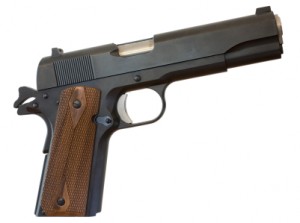Possession of an Unregistered Firearm

In order to secure a conviction of possessing an unregistered firearm, the government must prove beyond a reasonable doubt that: (1) the defendant possessed a firearm, (2) the defendant did so voluntarily and on purpose, and not by mistake or accident, and (3) the firearm had not been registered to the defendant as required by D.C. law.
“Possession” may be either actual (that is, the person has physical possession) or constructive (that is, the person has both the power and intent to control the property. “Firearm” is defined as a weapon, regardless of operability, that is designed as or readily converted into a device that can expel a bullet or other projectile by an action of an explosive.
The government does not need to prove that the defendant knew the firearm was not registered. Nor does the government need to prove who owned the firearm or that the firearm was registered to anyone.
It is a valid defense that the person temporarily possessed the firearm to prevent imminent death or great bodily harm to someone.
The penalty for violating this section is a maximum fine of $1000 and/or a maximum of one year imprisonment. D.C. Criminal Code 7-2502.01
